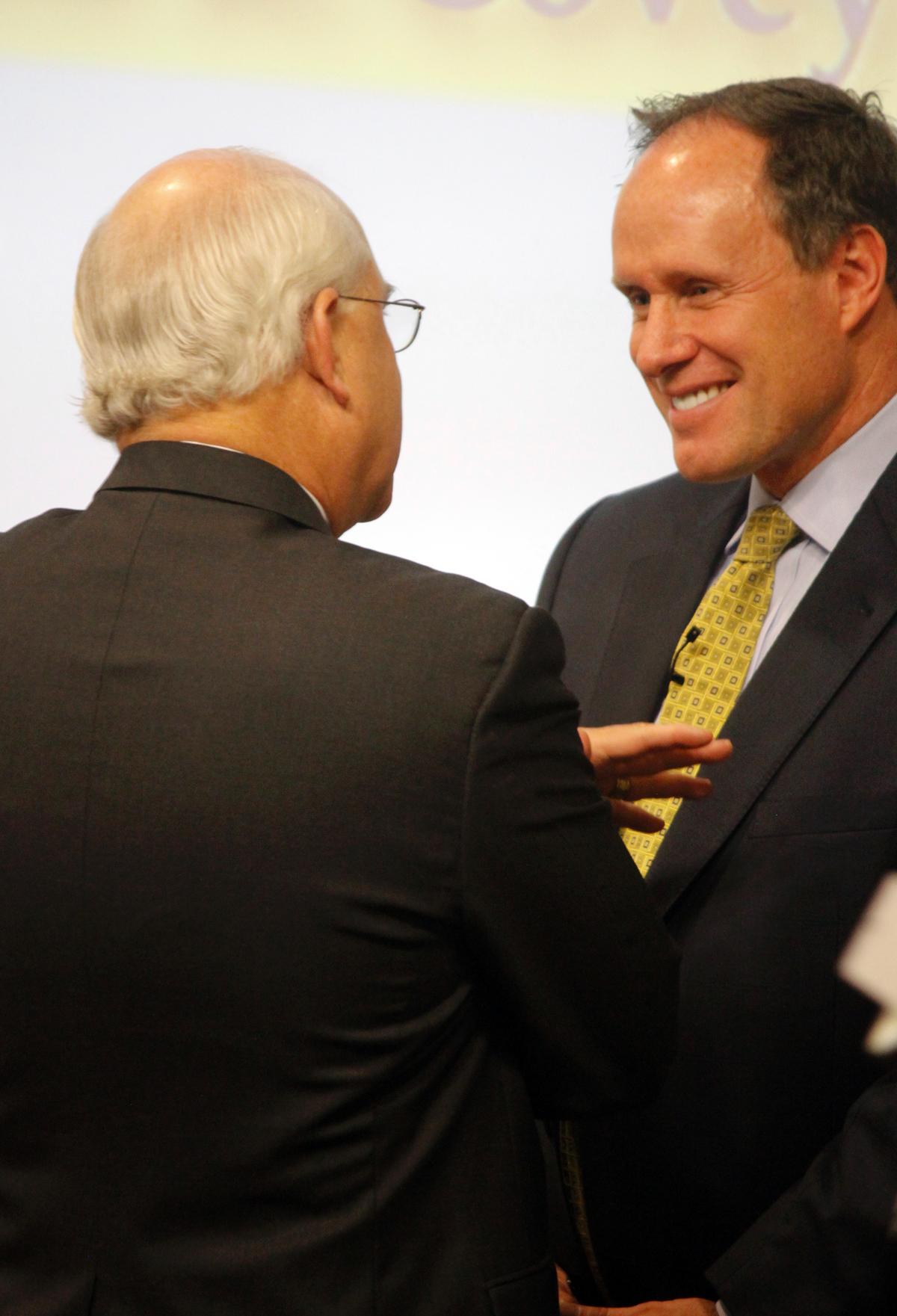Covey speaks on father’s legacy
In commemoration of what would have been his father’s 80th birthday, students and faculty of the Huntsman School of Business gathered Wednesday at a Dean’s Convocation Speech to hear author Stephen M.R. Covey reflect on his father’s legacy of leadership.
Covey’s father Stephen R. Covey, the Huntsman Presidential Chair in Leadership, a renowned educator, public speaker and bestselling author of “The 7 Habits of Highly Effective People,” passed away in July.
“I view this as a tribute from you to my father,” Covey said. “My father loved Utah State University and the Huntsman School of Business, and he was very thankful for this relationship. It was a great source of meaning in his life.”
Covey talked about the principles of leadership his father taught and how it impacted him and millions across the world.
“My father’s thinking has been the software of my mind,” Covey said. “It affects everything I do.”
Covey said his father taught that as individuals, we each have four needs – to live, to love, to learn and to leave a legacy. Covey said as students apply these needs as they search for a career, they can find a pathway they are passionate about.
“When you look for a career, be thinking in terms of these four things,” he said. “What need do I want to help in society? What do I love to do? What am I good at doing and what am I called to do? And as you overlap that inspiration, that’s finding your voice. My father taught that beautifully.”
Covey spoke about his father’s “rare gift” to reach out to millions through his books and speeches while also being able to reach the few or “the one.”
“Through his works, through his writings, through his teachings, he literally reached millions of people all over the world, and yet his most significant work was reaching the one,” Covey said. “My father believed in affirming the one. He believed in people even more than people believed in themselves.”
Covey spoke of many instances he saw his father, despite a rigorous schedule, extend effort to reach out to “the one” needing extra support or encouragement: helping his son’s high school friend with a speaking assignment, encouraging and befriending an international student lacking confidence in his abilities and listening and taking his time to say “I love you” to his wife and each of his nine children.
Covey said personal integrity was what gave his father the power to reach out to individuals.
“My father was a person of tremendous integrity,” he said. “He was who you thought he was. He tried to practice what he taught and to live what he was teaching. As good as my father was in public as an author and teacher, he was even better in private to my mother and as a father to us children. That integrity was the source of his power.”
Covey said his father focused on teaching universal, transcendent principles common to the foundation of any enduring society or philosophy, such as trustworthiness, fairness, kindness and integrity.
Covey said his father believed by focusing on the inside moving out, individuals could use their resourcefulness and initiative to make anything happen.
“My father taught, ‘If you think that the problem is out there, outside of you, that very thinking is the problem because you have just disempowered yourself,'” he said. That’s what the ‘7 Habits’ are all about.”
Covey said his father’s fundamental teaching to “begin with the end in mind” and to create personal and organizational mission statements helped empower him and millions across the world to reach their potential.
“My father thought, ‘I know what I want to do. I want to release human potential,’ and that’s what he’s done,” Covey said. “His ability to see more in me than what I saw in myself, his willingness to entrust me unlocked something inside me.”
Covey said his father knew he didn’t invent these principles of integrity and leadership, but he felt they came from God.
“He always gave credit to God,” Covey said. “He simply organized them and sequenced them and arranged them to make them valuable with people.”
Covey said his father’s enduring idea was to live with the mindset that the best was yet to come.
“He said always live life in crescendo, that your greatest contribution is always in front of you,” he said. “This is the person that wrote the ‘7 Habits,’ 20 million copies in 40-something languages, and yet he always believed his greatest book was still in front of him. That’s how he lived.”
Jeff Parker, business senator and senior in economics, said the Business School hosts events like the Dean’s Convocation to provide models and examples for students to learn from.
“The Business School as a whole would hope students would take example of ethical leadership and model their lives after it,” Parker said.
Parker said the opportunities such speakers and events, the Huntsman Scholar’s program, Go Global study abroad program, the International SEED program and others provide students valuable experience.
“We’ve started so many fantastic programs and I really hope students will take advantage of these programs,” he said. “This is what sets us apart from other universities.”
Michael Pe
ters, freshman majoring in marketing, said Covey’s speech was inspirational and taught him the power of influencing and impacting “the one.” Peters said speeches like Covey’s, as well as other programs and opportunities within the Huntsman School, affirm his decision to attend USU.
“The Huntsman School is definitely building me as a leader,” Peters said. “Events like this inspire me to become a better person both in my personal life and in the business world. I don’t think I could have got a better experience. Coming here was definitely the right decision.”
– karlie.brand@aggiemail.usu.edu

